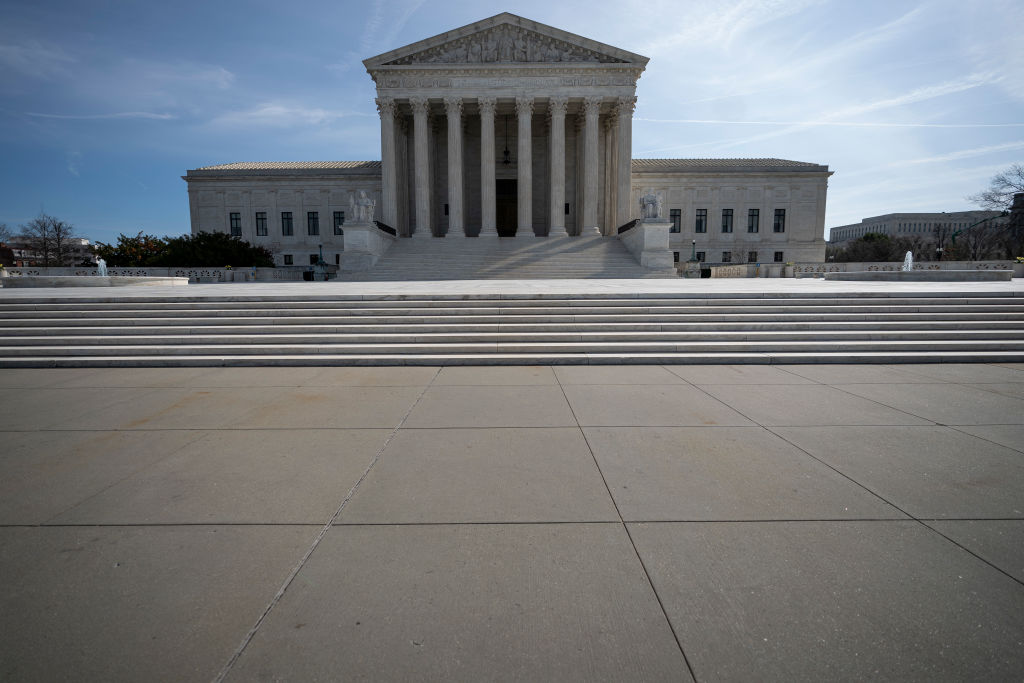Coronavirus is reshaping how the justice system works — perhaps permanently


A free daily email with the biggest news stories of the day – and the best features from TheWeek.com
You are now subscribed
Your newsletter sign-up was successful
Coronavirus could be the start of a long-term transformation for the American justice system.
As courts shut down amid the COVID-19 pandemic, attorneys and judges are struggling to prevent uncertain delays while still preserving justice under the law. It has translated into "a scramble for technological work-arounds" that could last beyond the outbreak, ABC News reports.
There are some pretty obvious dilemmas when it comes to holding jury trials and working through court cases in the time of coronavirus spread. Cramming 12 jurors in a box clearly doesn't fit the CDC's social distancing guidelines; neither does being in a bustling courthouse in general. But beyond a few imperfect attempts (immigration courts' attempts to replace in-person hearings with video chats were plagued with issues), courts haven't implemented many measures that allow judicial processes to continue at home.
The Week
Escape your echo chamber. Get the facts behind the news, plus analysis from multiple perspectives.

Sign up for The Week's Free Newsletters
From our morning news briefing to a weekly Good News Newsletter, get the best of The Week delivered directly to your inbox.
From our morning news briefing to a weekly Good News Newsletter, get the best of The Week delivered directly to your inbox.
"This disaster, this pandemic is going to change the way the courts do business from now on," Texas Supreme Court Justice Nathan Hecht told ABC News. "We're going to have to completely rethink how much has to be done in person, how much can be done using technology — that whole issue that we've just never paid much attention to, is going to be front and center going forward."
The Supreme Court has led the way by filing its first remote decisions since 2001 and continued its usual meetings via phone. But things aren't as simple in lower courts with far more moving parts, leaving the ACLU and other watchdogs on the lookout for potential violations of civil liberties and justice. Read more at ABC News.
A free daily email with the biggest news stories of the day – and the best features from TheWeek.com
Kathryn is a graduate of Syracuse University, with degrees in magazine journalism and information technology, along with hours to earn another degree after working at SU's independent paper The Daily Orange. She's currently recovering from a horse addiction while living in New York City, and likes to share her extremely dry sense of humor on Twitter.
-
 Local elections 2026: where are they and who is expected to win?
Local elections 2026: where are they and who is expected to win?The Explainer Labour is braced for heavy losses and U-turn on postponing some council elections hasn’t helped the party’s prospects
-
 6 of the world’s most accessible destinations
6 of the world’s most accessible destinationsThe Week Recommends Experience all of Berlin, Singapore and Sydney
-
 How the FCC’s ‘equal time’ rule works
How the FCC’s ‘equal time’ rule worksIn the Spotlight The law is at the heart of the Colbert-CBS conflict
-
 Nobody seems surprised Wagner's Prigozhin died under suspicious circumstances
Nobody seems surprised Wagner's Prigozhin died under suspicious circumstancesSpeed Read
-
 Western mountain climbers allegedly left Pakistani porter to die on K2
Western mountain climbers allegedly left Pakistani porter to die on K2Speed Read
-
 'Circular saw blades' divide controversial Rio Grande buoys installed by Texas governor
'Circular saw blades' divide controversial Rio Grande buoys installed by Texas governorSpeed Read
-
 Los Angeles city workers stage 1-day walkout over labor conditions
Los Angeles city workers stage 1-day walkout over labor conditionsSpeed Read
-
 Mega Millions jackpot climbs to an estimated $1.55 billion
Mega Millions jackpot climbs to an estimated $1.55 billionSpeed Read
-
 Bangladesh dealing with worst dengue fever outbreak on record
Bangladesh dealing with worst dengue fever outbreak on recordSpeed Read
-
 Glacial outburst flooding in Juneau destroys homes
Glacial outburst flooding in Juneau destroys homesSpeed Read
-
 Scotland seeking 'monster hunters' to search for fabled Loch Ness creature
Scotland seeking 'monster hunters' to search for fabled Loch Ness creatureSpeed Read
